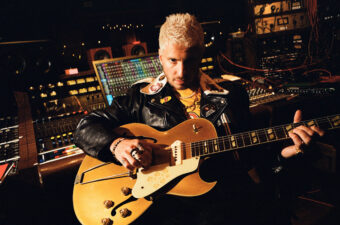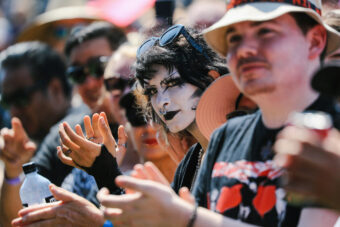By: William V. MeterThe members of Blur have alternately sobered up, gotten married,had kids, had a hit record with another group, protested the war inIraq, and dealt with a founding member’s departure. Are theystill the same band? Well, no. But on their new album, ThinkTank, they prove that’s a good thing
The members of Blur have alternately sobered up, gotten married, had kids, had a hit record with another group, protested the war in Iraq, and dealt with a founding member’s departure. Are they still the same band? Well, no. But on their new album, Think Tank, they prove that’s a good thing
It’s early February, and Blur are thrashing through “We’ve Got a File on You,” a one-minute punk barnstormer off their new album, Think Tank. Today, the audience in their North London practice space consists of two dilapidated vinyl couches and several overflowing ashtrays. An empty plastic cup rattles atop a blaring amp like it’s trying to pogo. Then, after easing into “Out of Time,” the only straightforward ballad on the sprawling album, the band takes a break. Drummer Dave Rowntree makes a call on his cell phone, bassist Alex James stares into space, and singer Damon Albarn gives the three backup soul singers some pointers. “Like this,” he instructs, then sings in an authoritative bellow, “No, I ain’t got nothin’ to be scared of!” from a new song called “Ambulance.” The six-foot Albarn, sporting saggy jeans and a large, dookie gold chain, looks more like a Brooklyn B-boy than a British pop star. A small peace symbol is pinned to the front of his mesh baseball cap. Mega-famous in England, the singer is also a self-described “pro-peace” activist who has protested the war on the steps of Parliament. “I just despair the lack of opposition,” Albarn says. “Musicians and artists should be opposed to aggression. I’m not saying we should all be raving left, politically correct automatons, but it is worrying how little passion there is out there.”
Blur are recovering from a war of their own. Just as the Think Tank sessions began, Graham Coxon, the band’s sensitive, disgruntled virtuoso guitarist and cofounder, left to pursue a solo career. “I still don’t think this was the necessary outcome,” Albarn says of Coxon’s departure. “Everyone deals with issues in their lives in different ways, and it was really obvious that Graham needed to get away from everything. I’ve known him since he was 11-he’s like my brother. We’re not speaking at the moment, but a few years of that is quite normal in families.” (After hearing Think Tank, Coxon told a British writer that he thought it was “underdeveloped and tech-y” and that he was “very glad” to no longer be in Blur.) Says James, “I was talking to Bernard Sumner from New Order about it and telling him how difficult it was. He said, ‘Fuck off! We lost our fucking singer!’ If you look at bands that have been around as long as we have [14 years], it’s a rite of passage.”
Instead of letting the rift destroy the band, Blur made one of the best albums of their career. Think Tank was recorded in Albarn’s London studio, a barn in Morocco (“If you had a donkey in the village, you were posh,” James quips), and the English countryside of Devon (“Where there’s nothing to do but look for badgers and count ducks,” James quips again). It feels rootless and cosmopolitan, the work of a band questioning their own assumptions. Punk rave-ups share space with reveries (“Sweet Song” and “Battery in Your Leg”); big-beat bluster (“Crazy Beat,” one of two tracks produced by Fatboy Slim) gives way to North African cribbing (“Moroccan Peoples Revolutionary Bowls Club”). Although Albarn wrote the lyrics (and ably fills in on guitar), there are no explicit antiwar messages. Songs like “Gene by Gene” sound strictly stream-of-consciousness, and James admits, “I don’t know what the record is about.” But its bold, subversive, transcultural spirit recalls the Clash’s Sandinista!–another album by a quintessentially British band trying to take in the whole world.
Evolution, of course, is nothing new for Blur; they followed über-Britpop albums like 1994’s Parklife and 1995’s The Great Escape with departures like 1997’s scrappy, indie-rock-indebted Blur (which yielded their only American hit, the football-stadium favorite “Song 2”) and 1999’s gorgeous, electronically tweaked 13, which sifted through the wreckage of Albarn’s relationship with Elastica’s Justine Frischmann.
After 13, there was silence.
“It got to a point where it was no longer fun being in Blur,” Rowntree says. “That’s why we stopped touring and did the dreaded side projects. There is nothing people like less than watching a band who aren’t enjoying themselves. And there is nothing more boring than listening to a record made by people who are doing it for the money.”
Rowntree delved further into computer animation with his company Nanomation, James started producing pop music, and Albarn focused on Gorillaz, the “cartoon band” he formed with Tank Girl illustrator Jamie Hewlett and hip-hop maestro Dan “the Automator” Nakamura. Their self-titled debut sold more than two million copies, eclipsing the U.S. sales of Blur’s six studio albums combined. The Gorillaz’s single “Clint Eastwood” was even nominated for a Best Rap Performance Grammy in 2002. “I told Jamie, ‘I know we’re not going to, but we had better not win this,'” Albarn recalls. “If we walked onstage, the audience would be like, ‘What the fuck?'”
At a tiny airport just north of London, Alex James is getting ready to fly. “Fuel pump-check,” he says. Dressed in head-to-toe black, he is sitting in the cockpit of the single-engine prop plane he shares with Rowntree. The small plane speeds down the runway and into the sky. From the air, the green fields are dotted with patches of last week’s snow.
“I really only aspired to be the bass player,” James says. “It takes about ten minutes to learn how to play.” Blur’s resident smart-ass, James often says flippant, self-deprecating things, like “All you need are three chords, a good haircut, and balls.” But such comments belie his seriousness about music.
“The weather is going to shit,” he says, looking out the window. “You have to have a bigger plane with a proper deicing system to go through these clouds. We would turn into a block of ice.” One might think that being taken up in the sky by a rock star piloting an aircraft the size of a large Cadillac would be a pants-shitting experience, but it isn’t. James exudes confidence. After an 11-minute flight, not wanting to end up like the Big Bopper, he lands as a cold downpour darkens the sky. “Flying probably saved my life,” he says. “It taught me how to be responsible.”
In the mid-’90s, if you went to any opening in London (art galleries, envelopes), James was sure to be there, beer in hand. “I blustered around as a fairly drunk person for 15 years,” he says. Last year, he gave up drinking and smoking. Probably the only bassist in rock who retains two personal assistants, James was known as much for his bored wit, good bone structure, and floppy bangs as for his bass playing. A heartthrob to British teenage girls, he recently married his girlfriend, Claire Neate.
“Suddenly, everything in my life is new,” he says. “It seems like anything’s possible. I haven’t felt like this since I was 16. And I want to play really fucking loud.”
“I was obviously involved with something that was doing very well,” Albarn says of Gorillaz. “It wasn’t an easy decision to come back to Blur. I had written it off, thinking it had run its course. I didn’t feel the band was functioning properly.”
As he’s saying this, Albarn is admiring a red Snoopy sweatshirt at a vintage-clothing stall in London’s Portobello Market. Strolling down the street with the singer is a bit like being in Mister Rogers’ neighborhood-a fictional place where you shoot the shit with owls and are on a first-name basis with the mailman. Albarn exchanges pleasantries with the butcher, the café waiters, and the clothing-store clerks smoking outside their shops. Everyone knows him because he has lived in the area for 15 years. His friends are part owners of the neighborhood record store Honest Jon’s, which doubles as a label through which Albarn released his Mali Music album and various dub and reggae records. When asked if he listens to rock music, Albarn bursts into uncontrollable laughter. “Not in about five years!” he screeches.
As the driving force behind Blur, Albarn writes all the songs and demos them himself before bringing them to the group. He treats working in his own studio, 13, like a real job, going in from 10 a.m. to 5 p.m. every day. “If you don’t have discipline,” says Albarn, who has a daughter with his girlfriend, artist Suzi Winstanley, “you will miss vast chunks of your child’s upbringing-which is not something I am prepared to do.” At subsequent rehearsals for their upcoming tour (with ex-Verve member Simon Tong on guitar), Albarn was tyrannical about going over the songs again and again, examining every nuance.
“I feel responsible for our legacy,” he says. “Inevitably, people are going to turn up requesting ‘Song 2’ and ‘Beetlebum.’ They are my songs, and if I can’t play them as well, I can still play them with integrity. They might be different, but not in spirit.”
Is he worried about the reception of Think Tank and “the new Blur”?
“The only time you worry is when you aren’t totally sure of something you did,” he says. “I did my best.”




